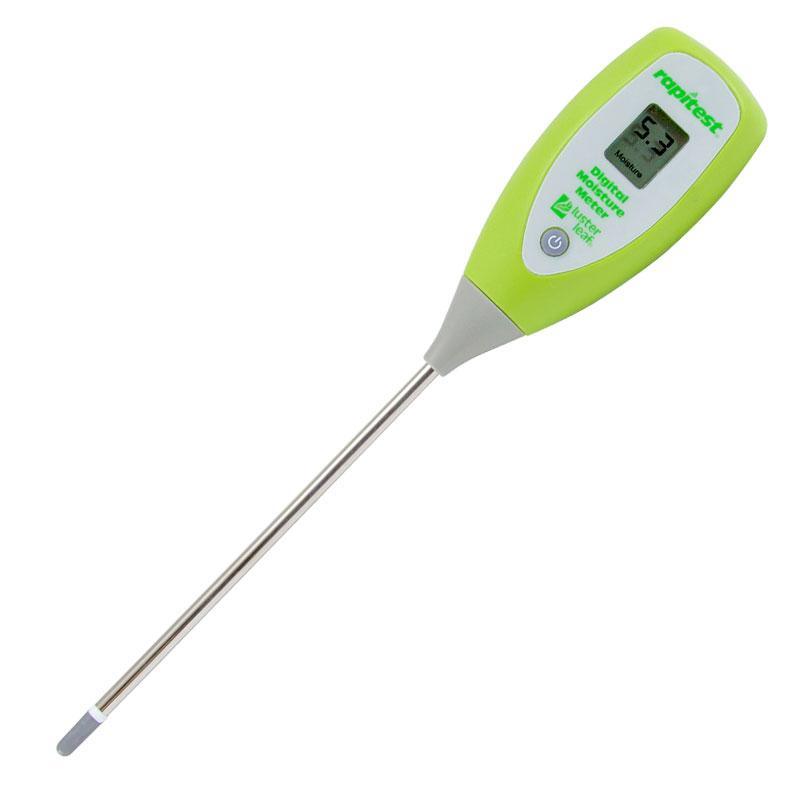The Ultimate Guide to Dampness Meters: A Comprehensive Review and How They Can Save You Cash
Moisture meters serve as indispensable tools in finding and keeping an eye on moisture web content in products, aiding in stopping pricey damages and ensuring the high quality of products. Comprehending the subtleties of various types of dampness meters, their applications, and the prospective cost-saving advantages they supply can be a game-changer for companies and professionals alike.
Sorts Of Moisture Meters
One typical kind is the pin-type dampness meter, which measures the electrical resistance in between two pins put right into a product. Pinless wetness meters, on the various other hand, use electromagnetic sensor plates to check a larger area without triggering damage to the product's surface area.

Additionally, there are additionally specialized dampness meters made for details products like grain, soil, or hay. These meters supply precise moisture readings tailored to the one-of-a-kind residential properties of the material being examined. Infrared moisture meters measure the thermal properties of a product to establish its dampness content non-invasively, making them helpful for applications where pin or pinless meters might not be appropriate. Comprehending the different kinds of moisture meters offered can aid markets pick the most ideal device for their certain dampness dimension demands.

Advantages of Making Use Of Dampness Meters
Moisture meters use vital advantages in properly keeping track of and examining wetness levels in diverse materials and atmospheres (Moisture Meter). Among the main benefits of making use of wetness meters is the prevention of prospective damages created by excess wetness. By discovering and addressing high wetness levels at an early stage, dampness meters assist to stop mold development, rot, and structural damages in buildings, conserving both time and money on fixings. In addition, moisture meters aid in guaranteeing the high quality of products throughout building and construction or manufacturing processes. By accurately measuring wetness web content, these tools aid keep the honesty of timber, drywall, concrete, and other products, lowering the risk of failings or defects.
Furthermore, making use of wetness meters can result in enhanced energy performance. By determining locations with high moisture levels, such as leakages or bad insulation, adjustments can be made to enhance energy conservation and reduce energy costs. In agricultural settings, dampness meters play a critical role in optimizing plant yields by allowing farmers to monitor soil moisture levels and make notified watering decisions. In general, the advantages of using moisture meters extend throughout numerous industries, giving cost-effective options and promoting better quality assurance practices.
How to Pick the Right Wetness Meter
When choosing a wetness meter, it's important to ensure that the meter is suitable for the particular material you will be testing. Different products have differing electric buildings that can impact moisture readings, so selecting a meter designed for your product is vital for accurate outcomes. By thoroughly reviewing these elements, you can select a dampness meter that satisfies your needs and provides precise moisture dimensions for your jobs.
Appropriate Techniques for Wetness Meter Use

Cost Financial Savings With Moisture Meter Applications
Exactly how can the calculated application of wetness meters lead to significant cost financial savings throughout numerous check my site industries? In the farming sector, wetness meters aid in determining the optimum time for harvesting plants, stopping over-drying or excess wetness that can impact the last product's high quality.
Similarly, in building and construction, dampness meters help prevent costly damages by detecting wetness levels in click here to find out more building materials, such as wood or concrete, which can bring about architectural concerns otherwise attended to promptly. By determining issue areas early, professionals can take corrective steps to avoid considerable repair services or substitutes, eventually saving time and money.
In addition, in the food handling market, wetness meters are crucial for checking item quality and ensuring compliance with security laws. By properly gauging moisture content in foodstuff, producers can stop spoilage, keep freshness, and reduce waste, resulting in considerable expense savings. Overall, the strategic application of wetness meters is an important financial investment that can bring about substantial cost decreases and enhanced effectiveness across numerous industries.
Conclusion
In final thought, dampness meters are beneficial tools for determining and spotting dampness levels in various materials. By using the right moisture meter and following appropriate techniques, individuals can properly avoid expensive damages triggered by excess wetness.
Wetness meters serve as important tools in detecting and keeping track of moisture content in products, helping in avoiding costly problems and making sure the top quality of products. Infrared dampness meters measure the thermal residential properties of a material view to identify its moisture content non-invasively, making them beneficial for applications where pin or pinless meters may not be suitable.Moisture meters supply vital benefits in accurately evaluating and keeping an eye on wetness degrees in diverse materials and atmospheres. In agricultural setups, wetness meters play a critical function in maximizing plant yields by allowing farmers to keep track of dirt dampness levels and make notified watering choices.In final thought, wetness meters are important tools for gauging and spotting dampness degrees in different materials.